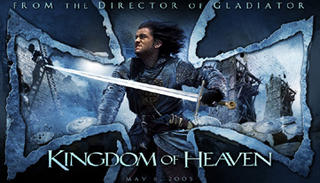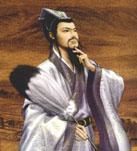
This review is in the current issue of Farrago, the Melbourne Uni student magazine. In retrospect it's a bit hard on Sir Ridley - seeing the film with your Crusades history class (lecturer included) disposes you towards criticism. For formatting reasons I've replaced italics with bold text.
____________________________________
Making a film about the crusades against the backdrop of the War on Terror was always going to be a delicate business. That said, when scholars are lining up to blast the production as ‘complete rubbish’ and ‘Osama bin Laden’s version of history’ the director has clearly missed the mark. Ridley Scott got away with sacrificing history to entertainment in Gladiator because that film didn’t ask viewers to believe they were watching the real thing. Kingdom of Heaven does, parading a Hollywood plot construction as fact and inevitably offending a great many people given the sensitivity of the subject matter. Scott’s boasts of the film’s authenticity have only deepened the hole he has dug for himself by rewriting the past as a progressive political statement. To make things worse, he hasn’t made a very good movie.
Balian the blacksmith (Orlando Bloom) is the illegitimate son of a crusader who has struck it big in the Holy Land and is back in France to tie up loose ends. Having indiscreetly murdered the local priest, Balian is persuaded by his old man to start afresh in the crusader Kingdom of Jerusalem. For this is a ‘Kingdom of Conscience’, a utopian project in a world bound by chains of class and religion, where men are judged by character and not their background. Not that this matters for Balian, given that he inherits his father’s fief of Ibelin and starts an affair with the king’s sister. Nevertheless his ‘quality’ is recognised by everyone from Arab noblemen to the leprosy-afflicted King Baldwin, who on his deathbed offers Balian the throne to keep it from the clutches of Guy de Lusignan and his fanatic Knights Templar. Unfortunately Balian defers to the warmongering Guy, who proceeds to get Jerusalem’s army destroyed by the Muslims, leaving Balian in charge of the city’s defence against the legendary Saladin.
One gets the feeling that Scott devised this Middle Eastern Camelot less from conviction than from a desire to avoid his subject matter’s political minefields. Ironically the resulting revisionist schemozzle stumbles right into them, hence the barrage of criticism from Cambridge academics to internet bloggers, Muslim and non-Muslim alike. Even uninformed viewers are not likely to buy Scott’s pitch of the crusader states as an egalitarian and multicultural paradise, hammered home by shots of Arab children cavorting round Balian as he dirties his hands making the Palestinian desert bloom. Audiences are more likely to see a prescription for the region’s current politics rather than an accurate representation of the Kingdom of Jerusalem, which rested on a feudal-religious hierarchy with Latin Christians at the top and Muslims at the bottom. To prop up this historical hatchet job, Scott resorts to demonising a particular group; casting the Templars as vicious fundamentalists is both wrong and as convincing as any cardboard caricature of plot villains. The more Scott bloats up his artificial edifice, the more factual license he has to take: Balian becomes a virtuous plebeian and Sibylla a free-riding amazon, Guy and Reynauld morph into Templars, Baldwin gets an extra year of life so he can be around for the film’s events.
Such historical gymnastics reveal Scott’s misconception of the task facing him. It was impossible for such a movie to be both politically neutral and accurate, since the crusades and the responding jihad were fundamentally religious projects that directed violence against unbelievers. Scott makes some concessions to history, including wild-eyed clerics preaching the sanctity of killing Muslims and Saladin’s casual beheading of Christian prisoners, but ultimately he shies away from confronting his subject matter. The result is not just synthetic but cheapens the realities of cultural and sectarian hatred, which in today’s political context ought to get more serious treatment. If Scott wanted an alternative focus then he could have explored the manipulation of ideas for political ends, a theme for which the crusades offer plenty of material. This would have allowed for even-handed contemporary resonances, from uncritical Western assertions of ethical purity to exploitation of the crusades as a diversion from the failures of Arab states.
Politics aside, Scott approaches this film from the wrong technical angle. Put simply he chooses spectacle over verisimilitude, notwithstanding that the latter marks out good period drama. In Kingdom of Heaven, the dunes of the Moroccan desert substitute for coastal Palestine. Jerusalem is unrecognisable, sitting in a featureless plain with a non-existent mountain rising in its centre. Battle scenes fall back on the tired formula of incoherent masses and heedless charges, without even a rudimentary effort to show tactics. The central battle of Hattin is glossed over completely, in favour of vistas of Quranic war banners, an improbably gaudy True Cross and Saladin’s army engaged in the first all-Arabian derby. Jerusalem’s bombardment resembles the opening night of Operation Iraqi Freedom more than a credible twelfth-century siege.
It is hard to believe that the man who directed Alien and Bladerunner accepted a script as flat as this one. All the characters are two-dimensional, excepting perhaps Balian’s short-lived father (Liam Neeson) and the withered King Baldwin. Balian’s character leaps full-fledged into the film, leaving Orlando Bloom with nothing to do but look rugged and show off his sword fighting skills. Even Saladin is reduced to a quasi-orientalist portrayal, passing up the chance to explore the complexities of this brilliant Kurdish warrior statesman. Indifferent characters can be carried by a strong story, but plot defects abound in Kingdom of Heaven. The film’s linearity suffers from unexplained scene cutting: one moment Balian is leading a refugee column out of Jerusalem, the next he’s back in France working as a blacksmith. Bizarre plot devices further erode the narrative’s credibility. Why is a Syrian aristocrat cross-dressing with his servant and pledging himself as Balian’s slave? Why does Balian prepare for assassins by sitting alone with no weapon outside his castle walls?
Because Kingdom of Heaven doesn’t quite work as a film, it comes across as a gratuitous political exercise. The very title should put viewers on guard as to the film’s authenticity. It is not void of redeeming qualities; Scott’s sense for colour and lighting remains exquisite, while the leper-king Baldwin evokes genuine pathos. But it fails dismally at the challenge of making history into entertainment.


1 comment:
This is a very nice one and gives in-depth information. Thanks for this nice article.
English Songs Lyrics
Post a Comment